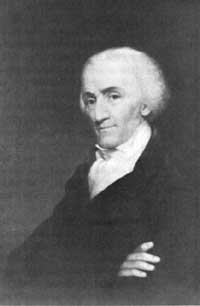







Biographical Sketches
|
ELBRIDGE GERRY Massachusetts |
 Elbridge Gerry | |
| ||
Gerry was born in 1744 at Marblehead, Mass., the third of 12 children. His mother was the daughter of a Boston merchant; his father, a wealthy and politically active merchant-shipper who had once been a sea captain. Upon graduating from Harvard in 1762, Gerry joined his father and two brothers in the family business, which consisted of exporting dried codfish to Barbados and Spain. In 1772-74 he entered the colonial legislature, where he came under the influence of Samuel Adams, and took part in the Marblehead and Massachusetts committees of correspondence. In June of the latter year, when Parliament closed Boston Harbor and Marblehead became a major port of entry for supplies donated by patriots throughout the Colonies to relieve the Bostonians, he aided in the transshipment.
Between 1774 and 1776, Gerry attended the first and second provincial congresses; served with Samuel Adams and John Hancock on the council of safety, which prepared the colony for war; and, as chairman of the committee of supply, a job for which his merchant background ideally suited him, raised troops and dealt with military logistics. During the night of April 18, 1775, he barely eluded capture by the British troops marching on Lexington and Concord. Following the adjournment of a meeting of the council of safety at an inn in Menotomy (Arlington), on the road from Cambridge to Lexington, he had retired for the night but responded to the alarm and fled.
Gerry entered the Continental Congress in 1776 and voted for independence in July, but his absence at the formal ceremonies on August 2 necessitated his signing the Declaration later in the year. His congressional specialties were military and financial matters, in both of which he demonstrated a duality of attitude that was to become his political trademark. He earned the nickname "soldiers' friend" for his advocacy of better pay and equipment, yet he vacillated on the issue of pensions. Despite his disapproval of standing armies, he recommended long-term enlistments. Although mistrustful of military officials, he befriended both George Washington and Thomas Conway, two generals who were implacable enemies.
Until 1779 Gerry sat on and sometimes presided over the congressional treasury board, which regulated Continental finances. An Army procurement agent as well as a merchant-supplier, he utilized information he obtained in Congress to benefit his lucrative business. On the other hand, he denounced profiteering and personally adhered to a fair-price schedule. In 1780, as wartime financial problems mounted, however, the Delegates resolved to revise the schedule. Gerry's vehement objections led to a quarrel, and he stormed out of Congress. Although nominally a Member, he did not reappear for 3 years. During the interim, he engaged in trade and privateering and saw duty in the lower house of the State legislature.
Back in Congress in 1783-85, Gerry numbered among those Representatives who had possessed talent as Revolutionary agitators and wartime leaders but who could not effectually cope with the painstaking task of stabilizing the National Government. He was experienced and conscientious, but created many enemies with his lack of humor, suspicion of the motives of others, and obsessive fear of political and military tyranny. In 1786, the year after leaving Congress, his fortune well established, he retired from business, married, and took a seat in the State legislature. The next year, he moved from Marblehead to Cambridge and purchased a confiscated Loyalist estate, where he was to reside for the rest of his life.
Gerry was one of the most vocal of the delegates at the Constitutional Convention of 1787. He antagonized practically everyone by his inconsistency and, according to a colleague, "objected to everything he did not propose." At first he advocated a strong Central Government, but ultimately rejected and refused to sign the Constitution, especially because it lacked a bill of rights and because he deemed it a threat to republicanism. He led the drive against ratification in Massachusetts. In 1789, when he changed his mind and announced his intention to support the Constitution, he was elected to the First Congress, where to the chagrin of the Antifederalists he championed Federalist policies.
Gerry left Congress for the last time in 1793 and retired for 4 years. During this time, he came to mistrust the aims of the Federalists, particularly their attempts to nurture an alliance with Britain, and sided with the pro-French Democratic-Republicans. In 1797 President John Adams appointed him as the only non-Federalist member of a three-man commission charged with negotiating a reconciliation with France, on the brink of war with the United States. During the ensuing XYZ affair (1797-98), Gerry tarnished his reputation. The French foreign minister duped him into believing that his presence in France would prevent war, and he lingered on long after the departure of the other disgusted commissioners. Finally, the embarrassed Adams recalled him, amid Federalist vituperation.
In 1800-03 Gerry, never very popular among the Massachusetts electorate because of his aristocratic haughtiness, met defeat in four bids for the Massachusetts governorship, but finally triumphed in 1810-12. Near the end of his two terms, scarred by partisan controversy, the Democratic-Republicans passed a devious redistricting measure to insure their domination of the State senate. In response, the Federalists heaped ridicule on Gerry and punningly coined the term "gerrymander" to describe the salamander-like shape of one of the redistricted areas.
Despite his advanced age, frail health, and the threat of poverty brought on by neglect of personal affairs, in 1813 Gerry accepted the Vice-Presidency in James Madison's Democratic-Republican administration. In the fall of 1814, the 70-year-old politician was stricken fatally while on the way to the Senate. He left his wife, who was to live until 1849, the last surviving widow of a signer, as well as three sons and four daughters. Gerry is buried in Congressional Cemetery at Washington, D.C.
Drawing: Oil, 1861, by James Bogle, after John Vanderlyn, Independence National Historical Park.
 |
 |
http://www.cr.nps.gov/history/online_books/declaration/bio12.htm
Last Updated: 04-Jul-2004